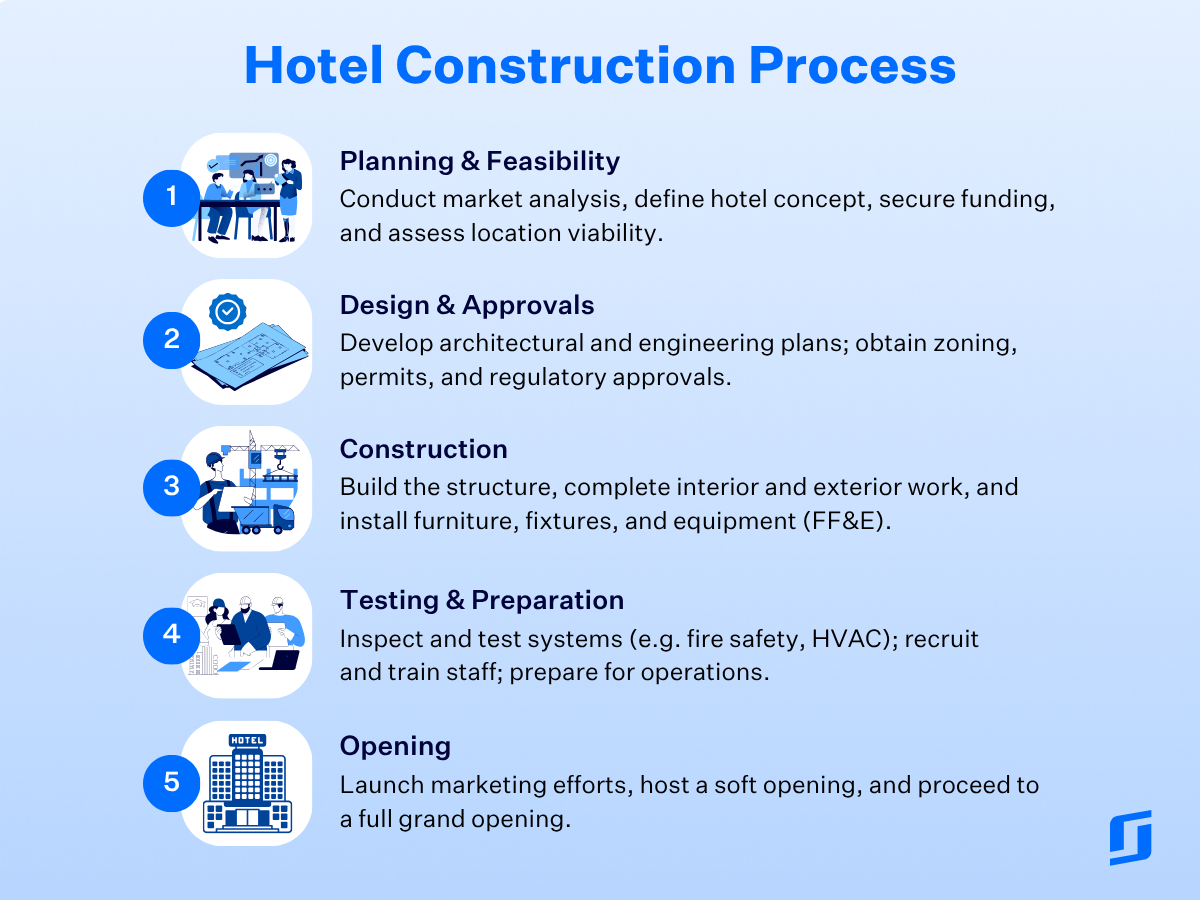What is hotel construction?
Hotel construction refers to the process of designing, planning, financing, and building new hotel properties, or significantly renovating existing ones. It’s a complex undertaking that involves more than just bricks and mortar. From site selection and zoning approval to sourcing contractors and setting up operational systems, every decision can affect how profitable and practical the final property will be.
For hotel owners and operators, particularly those managing a growing portfolio, the construction process also includes mapping out how the new property will meet market demand, deliver a memorable guest experience, and fit into broader business objectives. Whether you’re building a boutique hotel or expanding a midscale chain, the goal is the same: create a space that draws guests in and keeps operations running efficiently from day one.
In this blog, you’ll learn what drives hotel construction costs, how to avoid common project pitfalls, and the steps to building a successful hotel from feasibility studies to post-construction setup.
Table of contents
Why does hotel construction cost so much?
If you’ve ever found yourself wondering why hotel builds often stretch far beyond their initial budgets, you’re not alone. Construction is one of the largest investments a hotel owner can make, and one of the most unpredictable.
A big part of the cost comes down to what type of hotel you’re building. According to HVS’s 2024 survey, a midscale extended-stay hotel averages around $143,000 per room to build, while luxury properties can climb beyond $600,000 per room. These costs cover everything from architecture and permitting to construction materials, FF&E (furniture, fixtures, and equipment), and pre-opening expenses.
But it’s not just the upfront price tag. Construction projects are notoriously prone to overruns. Around 9 out of 10 projects exceed their budget, often by 15% or more, due to inaccurate estimates, delivery delays, or changes mid-build .
For hotel owners working within tight margins, these unexpected costs can delay openings and impact long-term profitability. That’s why understanding where the money goes, and where it’s most likely to blow out, is critical before breaking ground.
Set yourself up for success with SiteMinder
Prepare your systems, staff, and distribution strategy before you open your doors.
Learn more
Common challenges in a new hotel construction and how to avoid them
Building a hotel is a balancing act, managing timelines, compliance, budget, and future operations. And when things go wrong, the fallout can be expensive and time-consuming.
One of the most common pitfalls is underestimating the time and complexity involved in securing zoning approvals or building permits. Delays here can stall the entire project before a single brick is laid. In fact, permitting and approval bottlenecks are a key contributor to project delays, which saw a major spike in the hotel sector during the pandemic. At one point, the number of delayed hotel rooms under construction jumped by over a third year-on-year.
Budget creep is another major issue. Many projects go over budget due to estimating errors or unexpected on-site issues. Misjudging site conditions, failing to account for price volatility in materials, or rushing through the contractor selection process can all derail your plans. You may also run into complications if you haven’t considered local labour availability, weather risks, or supply chain reliability.
Avoiding these challenges starts with better planning, but also with choosing experienced partners who understand the specific risks of hotel builds and can offer a realistic, flexible project plan.

How to set up a successful hotel construction project plan
Hotel construction is about delivering a guest-ready property that aligns with your brand, meets market demand, and runs efficiently from day one. That means thinking well beyond the build itself. Below is a step-by-step guide to setting up a construction plan that works for medium-sized hotel operators juggling budgets, timelines, and future operations.
Planning
Market feasibility study
Before you even pick up the phone to a contractor, run a thorough market feasibility study. This helps you validate whether there’s real demand for a hotel in your proposed location. Look at local travel trends, occupancy rates, competitor performance, and the needs of your target audience. For example, the rise of extended-stay hotels, now accounting for 36% of all hotel projects under construction, suggests a growing demand for flexible, self-contained accommodation in many markets.
Location & zoning
Choosing the right site goes hand-in-hand with understanding zoning restrictions and land use regulations. Some regions may require hotels to have dedicated parking, limit building height, or comply with specific accessibility rules. Engaging with local authorities early can help you anticipate and address potential issues, from environmental assessments to community objections.
Preconstruction
Securing financing
Getting the financial structure right is one of the most critical aspects of the preconstruction phase. Hotel construction loans are harder to come by than they used to be, especially with lenders becoming more cautious. Many U.S. banks reduced hotel loan portfolios in early 2023, making it harder for smaller operators to access capital without strong business cases and collateral.
Explore options like SBA 504 loans, private lending, or partnerships with investors, and factor in contingency reserves of at least 10–15% to cushion against overruns.
Permits & approvals
You’ll need construction permits, health and safety signoffs, and in many cases, environmental clearances. These approvals can take months, and missing paperwork can grind everything to a halt. A project manager experienced in hospitality developments can help you streamline this step and manage submissions across agencies.
Choose hotel construction companies
Look for contractors with specific experience in hotel builds, not just commercial or residential work. They’ll be more familiar with industry nuances like FF&E timelines, guest-facing layouts, and soundproofing requirements. It’s also worth checking if they can deliver a design-build service, which can help reduce coordination issues between architects and builders.
Construction
Adhere to timelines & deadlines
Once the site is prepped and foundations are laid, keeping the build on track is crucial. Delays here can ripple into staffing, marketing, and even brand reputation. Yet many projects run behind due to scheduling conflicts, poor weather planning, or change requests. Make sure your contractor provides regular progress reports, and use project management tools to monitor milestones in real time.
Quality control & inspections
Don’t rely solely on final inspections. Schedule periodic walkthroughs and third-party checks throughout the build. This can help catch construction flaws early, such as substandard waterproofing or misaligned mechanical systems, before they become expensive rework items.
Post construction
Punch list
Your punch list is a final sweep of minor issues like paint touch-ups, faulty light switches, or uneven fittings that need to be addressed before the hotel opens. While it might seem minor, an unchecked punch list can lead to guest complaints and maintenance headaches down the line.
Set up systems & staff
With the building finished, attention turns to operations. This includes installing your property management system (PMS), connecting channel managers, and preparing the booking engine. Tools like SiteMinder can help centralise these systems early, making your go-live process smoother and reducing last-minute surprises.
Certifications
Before welcoming your first guests, you’ll need to finalise health and safety certifications, fire compliance, and in some areas, sustainability or accessibility documentation. Don’t leave this until the last week. Many of these require inspections or third-party approvals, which can take time to secure.
Integrate tools to manage the hotel construction process
Most hotel owners think of technology as something you implement after the doors open, but the right tools can make a major difference during construction, too. From project oversight to operational readiness, tech can give you a head start on streamlining how the property will run once guests walk through the door.
Start by considering your future tech stack early in the build. Your property management system (PMS), booking engine, and integrations with OTAs and payment gateways should all be factored into your timelines, especially when coordinating with contractors installing internet infrastructure, front desk setups, or smart room features.
Software like SiteMinder lets you configure your booking engine and distribution strategy while construction is still underway. That means your team can build out rate plans, test connectivity, and be ready to take reservations the moment certifications are cleared.
It also helps with hiring and training. Once your systems are in place, new staff can be onboarded before the hotel opens, using simulated bookings and dashboards to familiarise themselves with workflows.
The more you can embed operational tools into the final phases of construction, the smoother your opening will be and the faster you can start generating revenue.


